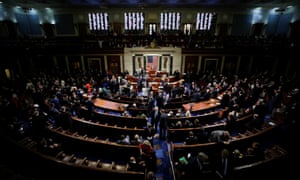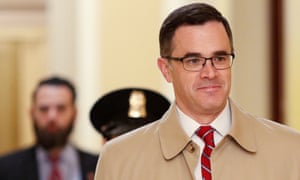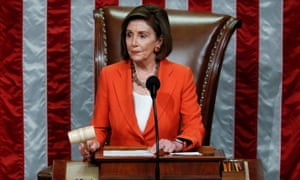Vote set rules for public phase of impeachment inquiry, laying out plan that could produce televised hearings within two weeks
For only the third time in the history of the modern presidency, the US House of Representatives voted on Thursday to formalize impeachment proceedings against the president of the United States.
In a largely party-line vote of 232-196, the House embarked on a path
that seemed likely to lead to Donald Trump’s impeachment – if not
necessarily his removal from office. The House speaker, Nancy Pelosi, presided over the vote and marked it with a bang of her gavel.Republicans held ranks to vote uniformly against the process, while two Democrats crossed party lines to join them. The House’s sole independent, former Republican Justin Amash of Michigan, voted to advance the resolution.
The vote set rules for the public phase of the inquiry, laying out a road map for impeachment that could produce dramatic televised public hearings within two weeks and a vote on impeachment itself by the end of the year.
“This resolution sets the stage for the next phase of our investigation, one in which the American people have the opportunity to hear from the witnesses firsthand,” the House intelligence chairman, Adam Schiff, said in a floor speech ahead of the vote.
“We will continue to conduct this inquiry with the seriousness of purpose that our task deserves because it is our duty and because no one is above the law.”
As the vote was announced, Trump tweeted: “The Greatest Witch Hunt In American History!” The White House issued a statement saying “the president has done nothing wrong” and calling the process “a blatantly partisan attempt to destroy the president”.
For weeks, congressional investigators have been interviewing witnesses – 15 and counting – behind closed doors about alleged misconduct by Trump, who stands accused of using the power of his office to solicit foreign interference in the 2020 US election.

The parade of witnesses was scheduled to continue on Thursday, with the testimony of Tim Morrison, a senior national security council official described in previous testimony as having a “sinking feeling” about the negotiations he witnessed between Trump proxies and the Ukrainians.
Morrison, the first White House political appointee to testify, dramatically resigned on the eve of his testimony and did not respond to reporters’ questions as he arrived on Capitol Hill on Thursday. While he had planned to testify anyway, Morrison’s resignation freed him absolutely from a blanket White House order that officials not participate in the impeachment inquiry.
Trump has denied wrongdoing, claiming that a July phone call in which he asked the Ukrainian president, Volodymyr Zelenskiy, for a political “favor”, as captured in a partial transcript released by the White House and backed up by witness testimony, was “perfect”.
The desired favor, as Trump himself explained in the call, was for Ukraine to investigate a company that had employed a son of Joe Biden, whom Trump saw as a top political threat. Trump also wanted an investigation that would cast doubt on Russian tampering in the 2016 election.
At the time, the White House had suspended almost $400m in military aid for Ukraine appropriated by Congress, and US diplomats had advised Ukrainian officials that a White House visit for Zelenskiy was contingent on the announcement of investigations.
If Trump is impeached, a Senate trial would follow, possibly early next year, with a two-thirds majority vote required to remove Trump from office.
Still in question was whether Morrison’s former boss, the then national security adviser John Bolton, who reportedly described the back-room Trump-Ukraine haggling as a “drug deal” that he wanted no part of, would testify before Congress. A lawyer for Bolton told Congress on Wednesday that while Bolton would not testify without a subpoena, the lawyer stood ready to receive a subpoena.
Testimony by Bolton, a Yale-educated lawyer, blistering conservative hawk and expert bureaucratic infighter, could be as damaging for Trump as any so far. Bolton reportedly told aides that Rudy Giuliani, Trump’s personal emissary in the Ukraine saga, was a “hand grenade” that could blow everyone up, and he encouraged multiple aides to take their concerns about Trump’s Ukraine dealings to the top lawyer on the national security council.
That lawyer, John Eisenberg, has also been invited to testify next week before congressional investigators.

The House vote on Thursday implemented a procedure likely to lead to the drafting of articles of impeachment against Trump in the judiciary committee.
When Pelosi banged the gavel, Republicans shouted “objection”, briefly sowing confusion as the clerk strained to be heard and Democrats countered with calls for order. The room eventually settled and the House returned to the rest of its agenda before leaving Washington for a week-long recess.
Moments after the vote, Republicans began their assault on Democrats in “swing” districts who supported the resolution, sending emails to supporters that accused the Democrats by name of participating in a “fraud”. With only two Democratic defections, that list includes members critical to the party’s majority.
Analysts have said that Trump is vulnerable to impeachment for abuse of power, obstruction of justice and contempt of Congress, charges familiar from previous impeachment proceedings against presidents Richard Nixon, who resigned, and Bill Clinton, who was impeached but not removed from office.
The procedure allows for Republicans to request witnesses and documents and provides for the presence of lawyers representing Trump at judiciary committee proceedings.
Before that stage, however, public hearings would play out before the intelligence committee, chaired by Schiff of California, who has been spearheading the impeachment inquiry.
Schiff would call witnesses who previously testified in closed-door depositions before investigators, with an eye on presenting to the public the strongest case against Trump. Many Americans who have not been following the twists and turns of the closed-door testimony would be hearing the allegations against Trump – and meeting the witnesses, who include senior officials in the White House, state department and Pentagon – for the first time.

No comments:
Post a Comment